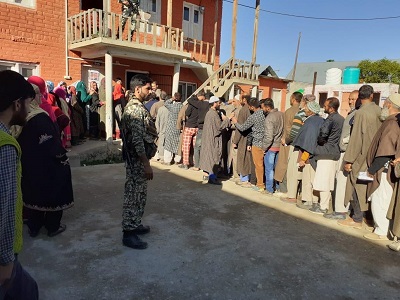Srinagar, (Samajweekly) The historic Supreme Court verdict on Article 370 has finally set at rest all speculation about the special status of J&K.
At the same time, the apex court has directed restoration of statehood to J&K as soon as possible.
The court also held that the assembly elections in J&K should be held by September 2024.
The court has clearly said that the restoration of statehood to J&K would not affect the status of Ladakh, which will continue to be a Union Territory.
Whether or not the Valley centric politicians of the National Conference and the Peoples Democratic Party accept the decision of the country’s highest court without a frown, the fact remains that the debate about the restoration of Article 370 is dried and dusted.
Union home minister Amit Shah had already said in Parliament while moving the motion for abrogation of Article 370 and downgrading of J&K into two Union Territories in August 2019 that statehood would be restored to J&K when the situation becomes normal there.
There have been an unprecedented 2 crore tourists who visited J&K during the last two years.
Academic activities have been going on without any hiccup for the last 3 years and not a single day of business activity was lost during this period to any separatist called shutdown or protest.
Stone pelting has completely stopped and people have been staying out of their homes for long hours during the evenings. Feasting and celebrations have been held without any threat of disruption from the separatists.
A general sense of security has returned to J&K together with the fear of law returning to those who benefitted by breaking it during the last over 3 decades.
Government offices and courts have functioned normally and the kidnapping and threatening of public servants seems to be a thing of the past.
The rule of law has been re-established together with respect for the orders passed by the courts.
Many government servants used to treat public service as a part time job and engaged in business activities and even acted like government contractors during the last 3 decades without fear of being punished.
Things have completely changed on this front as well. Biometric attendance, closer supervision and accountability has returned to public service. This has definitely helped the developmental projects of the government.
The results of government run schools have shown improvement and non-performers are bring gradually weeded out from government service now.
This is the rosy side of the picture that would normally favour holding of the J&K assembly elections simultaneously with the Lok Sabha elections early next year.
An argument advanced for holding the two elections together is that if the voters can come out freely for voting for the Lok Sabha why can’t they do so for the assembly elections as well.
The same polling booth could be used for casting both the votes.
Politicians have been regularly engaging in public activities, holding meetings and public rallies across Kashmir. People have been participating in political activities without fear of reprisal from the separatists.
These are arguments for holding the Lok Sabha and assembly elections simultaneously in J&K.
But, this is only one side of the story. The fact is that violence by the separatists and terrorist acts are down in J&K while nobody can say that terrorism is over.
Recently a police inspector was killed and another local cop grievously injured in a terrorist attack in Srinagar city.
Before this, a young deputy superintendent of police, an army Colonel and a Major were killed in encounters with the terrorists.
The number of terrorists operating in Kashmir and the hilly areas of Jammu division including Rajouri, Poonch, Doda, Reasi and Ramban districts is believed to be less now.
Yet, some of the most daring terrorist attacks have taken place in Rajouri/Poonch areas by the terrorists this year killing army personnel and some members of the minority Hindu community.
While holding the Lok Sabha elections needs a much lesser number of contestants to be protected and provided security, those contesting the newly carved out 90 assembly seats would need scores.
Every contestant has to be provided security and every public meeting conducted by the contestants for the assembly elections would need to be secured.
In contrast to 90 assembly seats there are only 5 Lok Sabha seats in J&K.
The number of security forces to be deployed for assembly elections would have to be nearly twice the number deployed for the Lok Sabha polls.
In contrast to the Lok Sabha polls, the forthcoming assembly elections are likely to be twice more public participative. Locals always show more enthusiasm for assembly elections than they do for the Lok Sabha polls.
This fact would require extraordinary focus by the administration and the security forces on the assembly elections.
Not only would the security forces have to keep the terrorists at bay from disrupting and disturbing the electoral process during the assembly polls, it would stretch the resources of both the administration and the security forces to the limit.
Since the assembly elections in J&K are definitely going to be largely participated in by the people, it would give more soft targets to the terrorists.
A small terror incident could make the much awaited assembly electoral process go haywire.
Out of the 90 assembly seats there are 46 in the Valley and 44 in Jammu division. Out of the 46 assembly seats in the Valley, more than 35 would be vulnerable to disruption by the terrorists.
Out of the 44 seats in Jammu division more than half would need extraordinary security arrangements to secure the poll process from disruption by the terrorists.
In a nutshell, the Supreme Court deadline on holding assembly elections must be respected and yet the final decision on the actual timing of the assembly elections must be left to the Election Commission of India that is constitutionally mandated to hold these elections.









